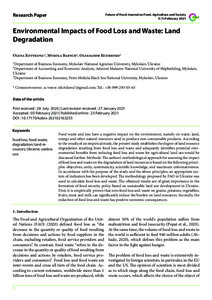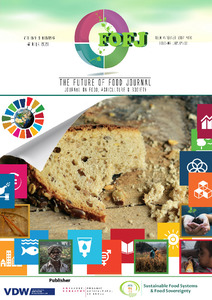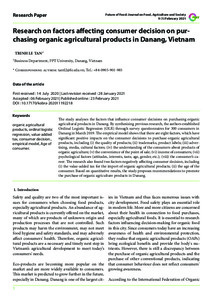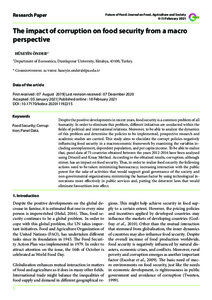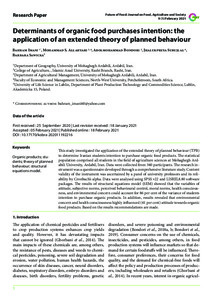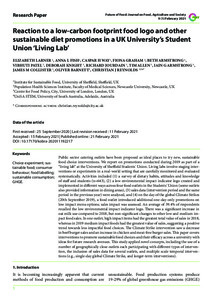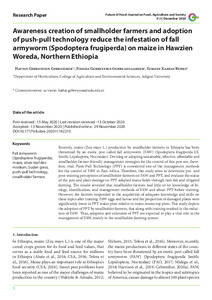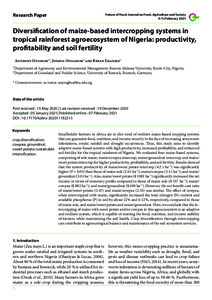Suche
Anzeige der Dokumente 1-8 von 8
Aufsatz

 Environmental Impacts of Food Loss and Waste: Land Degradation
Environmental Impacts of Food Loss and Waste: Land Degradation
(2021-02-23)
Food waste and loss have a negative impact on the environment through water, land, energy and other natural resources that are used to produce non-consumable products. According to the results of an empirical study, to establish the degree of degradation of land resources as a result of food loss and waste, as well as to identify potential environmental benefits from reducing food loss and waste for agricultural land use. Methods: The authors’ methodological approach for assessing the impact of food loss and waste ...
Zeitschrift
 Vol. 9 No. 1 (2021)
Vol. 9 No. 1 (2021)
(Specialized Partnerships in Sustainable Food Systems and Food Sovereignty, Faculty of Organic Agricultural Sciences, the University of Kassel, Germany and the Federation of German Scientists (VDW), 2021)
Aufsatz

 Research on factors affecting consumer decision on purchasing organic agricultural products in Danang, Vietnam
Research on factors affecting consumer decision on purchasing organic agricultural products in Danang, Vietnam
(2021-02-23)
The study analyses the factors that influence consumer decisions on purchasing organic agricultural products in Danang. By synthesizing previous research, the authors establish Ordinal Logistic Regression (OLR) through survey questionnaires for 300 consumers in Danang in March 2019. The empirical model shows that there are eight factors, which have significantly positive impacts on the consumer decisions to purchase organic agricultural products, including: (i) the quality of products; (ii) trademarks, product labels; ...
Aufsatz

 The impact of corruption on food security from a macro perspective
The impact of corruption on food security from a macro perspective
(2021-02-18)
Despite the recent developments food security is one of the common problems of humanity. In order to eliminate this problem, various initiatives are taken in the fields of political and international relations backed by many academic studies that are conducted to scrutinize the dynamics of the problem and inspire the policies to be implemented. This study aims at providing macro solutions to the problem through the study of the relationship between food security and corruption in view of variables such as unemployment, ...
Aufsatz

 Determinants of organic food purchases intention: the application of an extended theory of planned behaviour
Determinants of organic food purchases intention: the application of an extended theory of planned behaviour
(2021-02-18)
This investigated the application of the extended theory of planned behavior (TPB) to determine Iranian students’ intention to purchase organic food products. The statistical population comprised all students in the field of agriculture sciences at Mohaghegh Ardabili University, Ardabil, Iran. Data were collected from 340 participants. The research instrument was a questionnaire developed through a comprehensive literature study. The content validity of the instrument was ascertained by a panel of university professors ...
Aufsatz

 Reaction to a low-carbon footprint food logo and other sustainable diet promotions in a UK University’s Student Union ‘Living Lab’
Reaction to a low-carbon footprint food logo and other sustainable diet promotions in a UK University’s Student Union ‘Living Lab’
(2021-02-21)
Purpose: Public sector catering outlets have been proposed as ideal places to try new sustainable food choice interventions. We report on promotions conducted as part of a “Living Lab” at the University of Sheffield Students Union during 2019.Methodology: Activities include 1) a survey of dietary habits, attitudes and knowledge of staff and students (n=643). 2) A low environmental impact indicator logo was created and implemented in different ways across four food outlets in the Students Union (some outlets also ...
Aufsatz

 Awareness creation of smallholder farmers on and adoption of push-pull technology reduces fall armyworm (Spodoptera frugiperda) infestation on maize in Hawzien Woreda, Northern Ethiopia
Awareness creation of smallholder farmers on and adoption of push-pull technology reduces fall armyworm (Spodoptera frugiperda) infestation on maize in Hawzien Woreda, Northern Ethiopia
(2020-11-28)
Recently, maize (Zea mays L.) production by smallholder farmers in Ethiopia has been threatened by an exotic pest called fall armyworm (FAW) (Spodoptera frugiperda J.E. Smith; Lepidoptera, Noctuidae). Devising or adopting sustainable, effective, affordable and smallholder farmers-friendly management strategies for the control of this pest are, therefore, vital. Push-Pull Technology (PPT) is considered one of the management methods for the control of FAW in East Africa. Therefore, the aim of this study is to determine ...
Aufsatz

 Diversification of maize-based intercropping systems in tropical rainforest agroecosystem of Nigeria: productivity, profitability and soil fertility
Diversification of maize-based intercropping systems in tropical rainforest agroecosystem of Nigeria: productivity, profitability and soil fertility
(2021-02-07)
Monocropping of maize is becoming unsustainable in the rainforest agroecosystem of Nigeria. This is due to the adverse impact of climate change such as increasing pests and disease infestations and erratic rainfall patterns coupled with underutilization of resources. Smallholder farmers in this tropical agroecosystems are in dire need of adaptive and resilient cropping systems to ensure food, nutrition, and livelihood security. Thus, this study aims to identify adaptive maize-based systems for the rainforest agroecology ...

